Celebrating women in Women’s month: Faika’s trip to Tarragona in Spain
Faika at the BIP
Faika Haroun, an Academic and Professional Literacies lecturer at the Language Centre, had the privilege of visiting the Roviira i Virgili University (URV) from 9 to 13 December last year. This Spanish public university has its faculty of law and humanities at the Catalunya campus in Tarragona. URV is also part of the International Network of Universities (INU), a global collaboration that includes Stellenbosch University (SU).
Lidia du Plessis from Stellenbosch International (SUI) introduced Faika to the INU, and SUI funded her trip, while the URV provided accommodation in Tarragona. In celebration of Women’s month, we chatted to Faika to hear more about the trip.
“I was welcomed by Rebeca Tómas Smith, director of the international office at the URV. She had arranged for my visit to coincide with the blended intensive programme (BIP) on internationalisation at home, in which I participated and where I had the opportunity to present. This programme guides students and staff to become interculturally competent. In addition to the BIP, I attended the Inclusive Comprehensive Internationalisation Conference. This conference featured presentations by both lecturers and students, who shared their international experiences. During the breakaway sessions, I was introduced to collaborative online international learning (COIL), a teaching methodology that facilitates collaboration with international and local partners.
I must mention that I established a meaningful connection with Marina Vives i Cabré, one of the organisers of and presenters at of the BIP. From our first meeting, we discovered that we shared many interests and experiences, both personally and professionally.
Presenting at the BIP
BIP participants
Tarragona is rich in culture and history. One afternoon, the BIP participants were shown around the city. We visited many of the Roman and medieval sites in the city, and stopped at the lookout point which is referred to as the gateway to the Mediterranean. When the locals visit there, they say they are ‘touching iron’, because of the iron railing.
This experience was invaluable in establishing international relationships for future collaboration. It also gave me insight into how intercultural competency is addressed internationally. A key difference between Europe and South Africa is that, in European institutions, intercultural competency is often viewed as internationalisation, whereas at Stellenbosch University we view intercultural competency as being able to communicate across various cultures within the borders of South Africa.”
Touching iron
A key difference between Europe and South Africa is that, in European institutions, intercultural competency is often viewed as internationalisation, whereas at Stellenbosch University we view intercultural competency as being able to communicate across various cultures within the borders of South Africa.”
Exploring Tarragona
Roman theatre
Interested in what exactly Academic and Professional Literacies are? Read more here.
– by Faika Haroun
